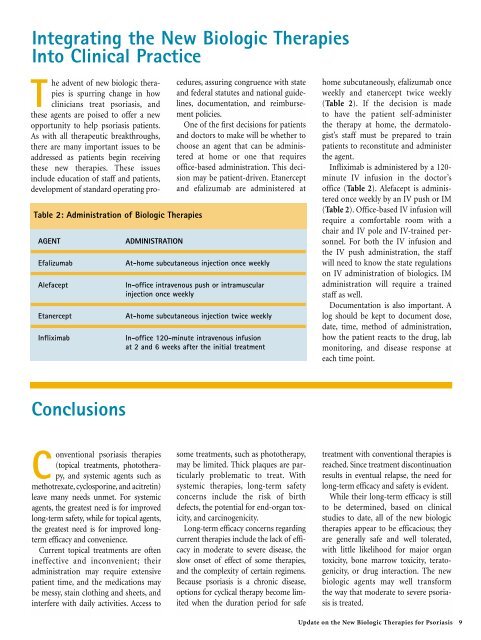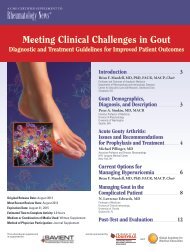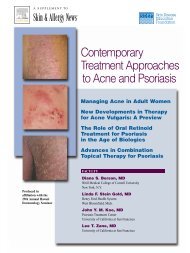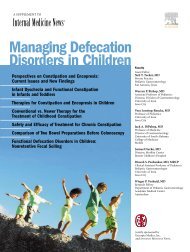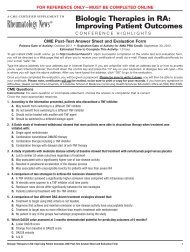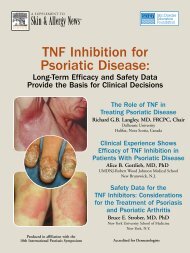Overview Of Psoriasis - Global Academy for Medical Education
Overview Of Psoriasis - Global Academy for Medical Education
Overview Of Psoriasis - Global Academy for Medical Education
Create successful ePaper yourself
Turn your PDF publications into a flip-book with our unique Google optimized e-Paper software.
Integrating the New Biologic Therapies<br />
Into Clinical Practice<br />
The advent of new biologic therapies<br />
is spurring change in how<br />
clinicians treat psoriasis, and<br />
these agents are poised to offer a new<br />
opportunity to help psoriasis patients.<br />
As with all therapeutic breakthroughs,<br />
there are many important issues to be<br />
addressed as patients begin receiving<br />
these new therapies. These issues<br />
include education of staff and patients,<br />
development of standard operating pro-<br />
Table 2: Administration of Biologic Therapies<br />
AGENT<br />
Efalizumab<br />
Alefacept<br />
Etanercept<br />
Infliximab<br />
ADMINISTRATION<br />
cedures, assuring congruence with state<br />
and federal statutes and national guidelines,<br />
documentation, and reimbursement<br />
policies.<br />
One of the first decisions <strong>for</strong> patients<br />
and doctors to make will be whether to<br />
choose an agent that can be administered<br />
at home or one that requires<br />
office-based administration. This decision<br />
may be patient-driven. Etanercept<br />
and efalizumab are administered at<br />
At-home subcutaneous injection once weekly<br />
In-office intravenous push or intramuscular<br />
injection once weekly<br />
At-home subcutaneous injection twice weekly<br />
In-office 120-minute intravenous infusion<br />
at 2 and 6 weeks after the initial treatment<br />
home subcutaneously, efalizumab once<br />
weekly and etanercept twice weekly<br />
(Table 2). If the decision is made<br />
to have the patient self-administer<br />
the therapy at home, the dermatologist’s<br />
staff must be prepared to train<br />
patients to reconstitute and administer<br />
the agent.<br />
Infliximab is administered by a 120-<br />
minute IV infusion in the doctor’s<br />
office (Table 2). Alefacept is administered<br />
once weekly by an IV push or IM<br />
(Table 2). <strong>Of</strong>fice-based IV infusion will<br />
require a com<strong>for</strong>table room with a<br />
chair and IV pole and IV-trained personnel.<br />
For both the IV infusion and<br />
the IV push administration, the staff<br />
will need to know the state regulations<br />
on IV administration of biologics. IM<br />
administration will require a trained<br />
staff as well.<br />
Documentation is also important. A<br />
log should be kept to document dose,<br />
date, time, method of administration,<br />
how the patient reacts to the drug, lab<br />
monitoring, and disease response at<br />
each time point.<br />
Conclusions<br />
Conventional psoriasis therapies<br />
(topical treatments, phototherapy,<br />
and systemic agents such as<br />
methotrexate, cyclosporine, and acitretin)<br />
leave many needs unmet. For systemic<br />
agents, the greatest need is <strong>for</strong> improved<br />
long-term safety, while <strong>for</strong> topical agents,<br />
the greatest need is <strong>for</strong> improved longterm<br />
efficacy and convenience.<br />
Current topical treatments are often<br />
ineffective and inconvenient; their<br />
administration may require extensive<br />
patient time, and the medications may<br />
be messy, stain clothing and sheets, and<br />
interfere with daily activities. Access to<br />
some treatments, such as phototherapy,<br />
may be limited. Thick plaques are particularly<br />
problematic to treat. With<br />
systemic therapies, long-term safety<br />
concerns include the risk of birth<br />
defects, the potential <strong>for</strong> end-organ toxicity,<br />
and carcinogenicity.<br />
Long-term efficacy concerns regarding<br />
current therapies include the lack of efficacy<br />
in moderate to severe disease, the<br />
slow onset of effect of some therapies,<br />
and the complexity of certain regimens.<br />
Because psoriasis is a chronic disease,<br />
options <strong>for</strong> cyclical therapy become limited<br />
when the duration period <strong>for</strong> safe<br />
treatment with conventional therapies is<br />
reached. Since treatment discontinuation<br />
results in eventual relapse, the need <strong>for</strong><br />
long-term efficacy and safety is evident.<br />
While their long-term efficacy is still<br />
to be determined, based on clinical<br />
studies to date, all of the new biologic<br />
therapies appear to be efficacious; they<br />
are generally safe and well tolerated,<br />
with little likelihood <strong>for</strong> major organ<br />
toxicity, bone marrow toxicity, teratogenicity,<br />
or drug interaction. The new<br />
biologic agents may well trans<strong>for</strong>m<br />
the way that moderate to severe psoriasis<br />
is treated.<br />
Update on the New Biologic Therapies <strong>for</strong> <strong>Psoriasis</strong> 9


